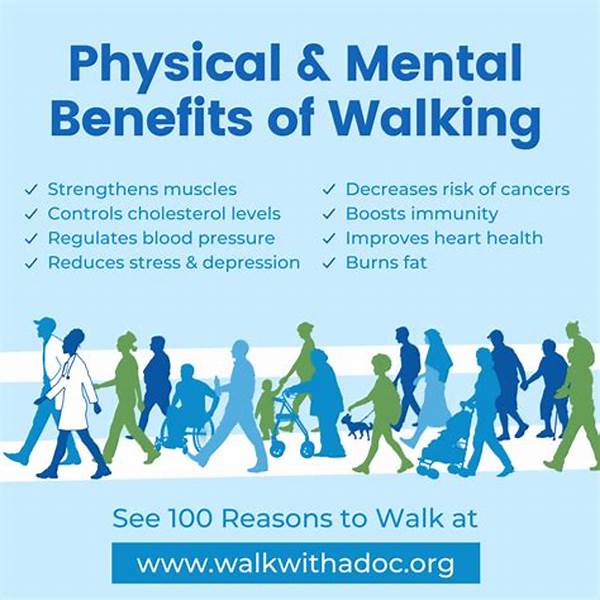Experts Share How Daily Walks Can Reduce Social Anxiety
Imagine waking up to a bright morning, the sun dappling the streets with a gentle glow, and a gentle breeze beckoning you outside. For many, this scene is not just a fleeting thought but a daily ritual. Walking, a simple yet profound act, has been rediscovered as a remarkable remedy for reducing social anxiety, and experts are eager to shed light on how daily walks can create a positive ripple effect in one’s life. In today’s fast-paced world, social anxiety has become a silent epidemic, infiltrating the lives of millions like an uninvited guest at a party. Yet, solace may not be far away; it’s as close as your next step.
Read More : Diy Aromatherapy Remedies For Anxiety That Actually Work
Walking, a practice as old as time, might just be the ingenuous cure our society overlooked. Experts share how daily walks can reduce social anxiety, highlighting how connecting with nature, self-reflection, and mindful breathing during walks form the bedrock of this natural therapy. But how exactly does this come to be? Let’s walk this path together to understand the science and the stories.
Studies show that regular physical activity, particularly walking, aids in reducing cortisol levels—the notorious stress hormone. When we engage in a daily routine of leisurely strolls, it’s like sending a message to our brain, whispering, “Relax, you’re safe.” This biological feedback loop can significantly alleviate anxiety symptoms. And it’s not just the physiological benefits; the psychological gains are equally compelling.
Imagine the mere act of setting foot outside as a ceremonial doorway into tranquillity. As you meander through trees swaying in the soft breeze or navigate the familiar lanes of your neighborhood, your mind starts to declutter. Concerns about upcoming social interactions begin to fade, and in that sacred space of walking, clarity emerges. Whether it’s a solo jaunt through the park or a casual walk with a friend, the rhythm of footsteps provides a metronomic reassurance, grounding individuals in the moment and quietly preparing them for the next social engagement with improved confidence and reduced anxiety.
The Transition from Isolation to Engagement
Walking is more than just physical activity—it’s an invigorating escape, seamlessly transitioning individuals from isolation to social engagement. Many experts share how daily walks can reduce social anxiety, emphasizing the duality of solitude and potential social interaction. For some, walking in bustling areas can gradually desensitize their fear of crowds, while others find peace in less populated paths, allowing them to recharge effectively. Either way, this journey is personal and transformative.
—
The Science behind the Smile: How Walking Transforms Mood
While many might view walking as just a means to an end—perhaps moving from point A to B—the underlying transformation it provides is profound. Daily walks stimulate the release of endorphins, those delightful chemicals that foster feelings of happiness and relaxation. They’re your body’s own produced magic pills, void of side effects yet bursting with benefits. These naturally occurring opiates work in harmony, seamlessly reducing tension and painting a brighter worldview for those hampered by anxiety.
Experts share how daily walks can reduce social anxiety through an intriguing balance of adventure and ritual. By setting small, achievable goals—perhaps noticing three new things on each walk or slowly elongating the route—individuals can effortlessly nurture a sense of accomplishment and self-worth. A stroll, thus, becomes a mobile classroom of life’s subtle lessons, a moving antidote to anxiety.
Crafting Your Walking Ritual
Every journey begins with a single step, and creating your personalized walking ritual can become a cornerstone of social anxiety management. Finding a time and space that suits your rhythm is as crucial as the walk itself. Perhaps your sanctuary lies within morning hues or maybe beneath the starlit night sky. Align your steps with your spirit, allowing each walk to serve as a gentle reminder of your potential to overcome social anxiety.
—
9 Actions to Incorporate Walking for Anxiety Relief
Discover how to harness the power of walking effectively:
Walking: More Than a Mere Movement
Each step becomes a gesture of defiance against the mental chains of social anxiety. Grounded in a world inundated by screens and noise, walking provides an eloquent escape to simplicity. Curious yet? Embark on your own journey, and let the path guide you to newfound calm and confidence.
—
Stories and Testimonials: A Walk to Remember
Walking has forged stories of personal victories and testimonials echoing recovery and hope. Take Jane, for example, who unearthed her voice amidst evening promenades. With every amble, the weight on her chest lifted, leaving room for breathtaking conversations and connections she once only dreamed of. Then there’s Mark, who discovered his penchant for photography on these walks, capturing life’s silent moments, transitioning from anxiety to artistry.
It’s these stories that breathe life into the promise that experts share how daily walks can reduce social anxiety. They reveal that you’re not merely walking through your neighborhood—you’re journeying through your mental landscapes, one step at a time, towards a new horizon of calm connections.
